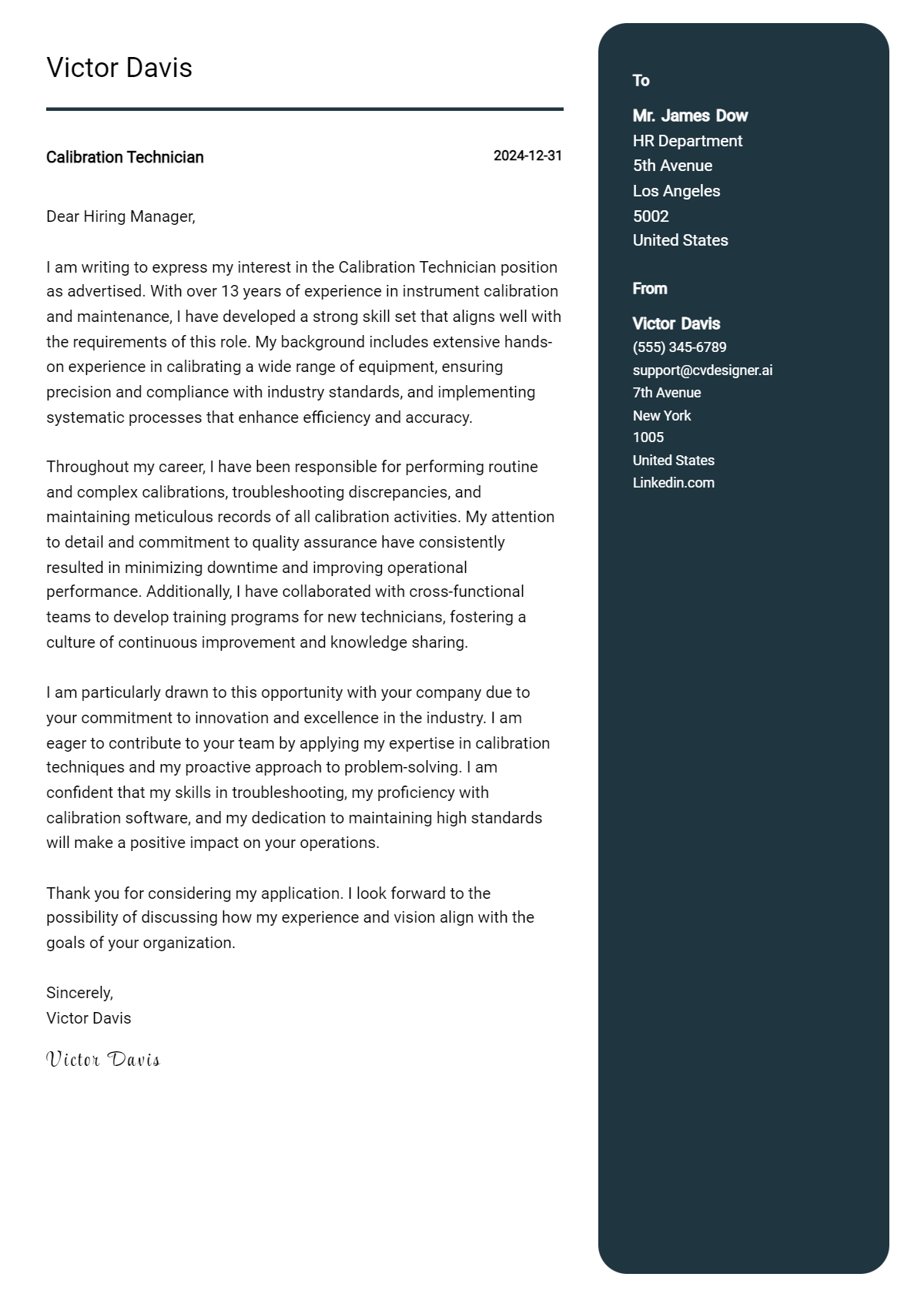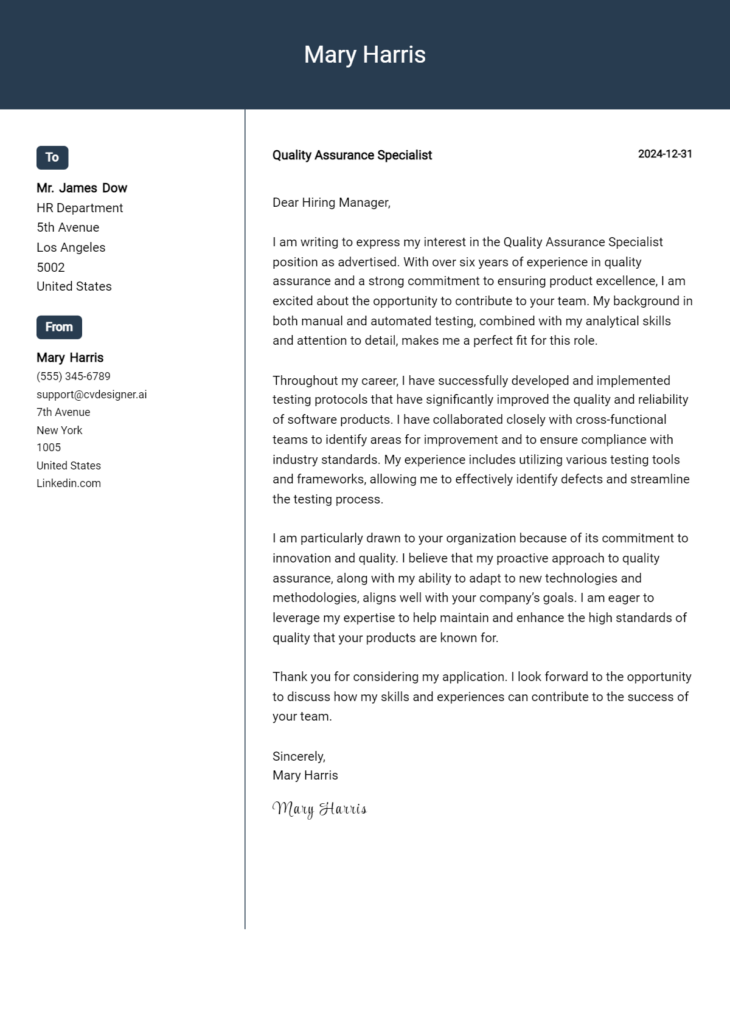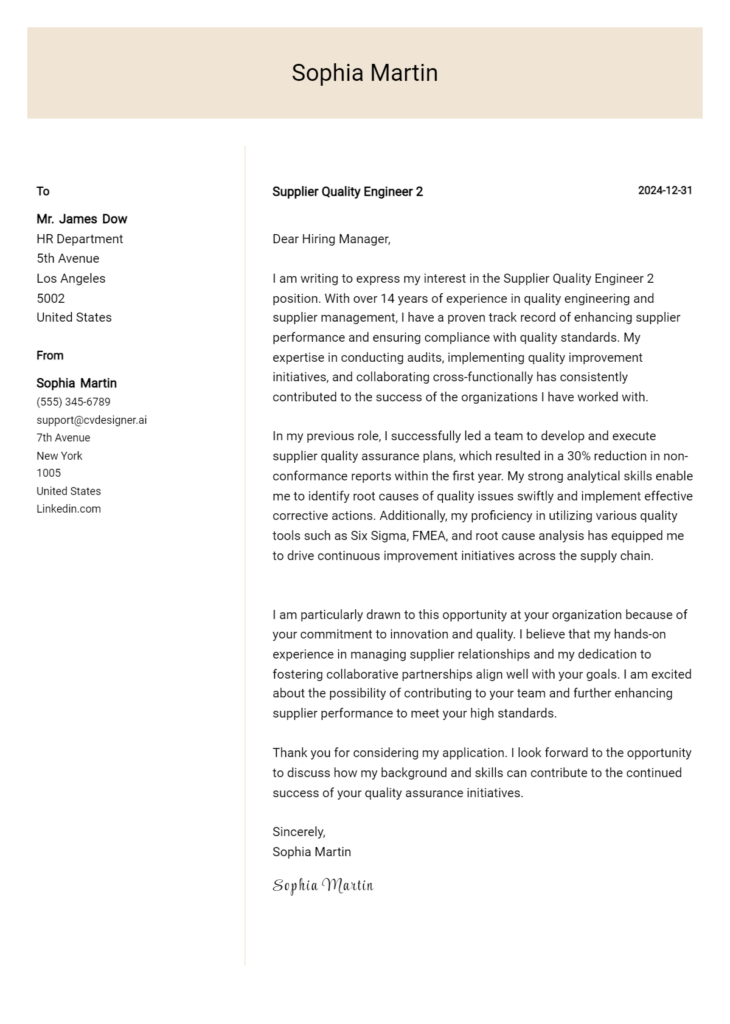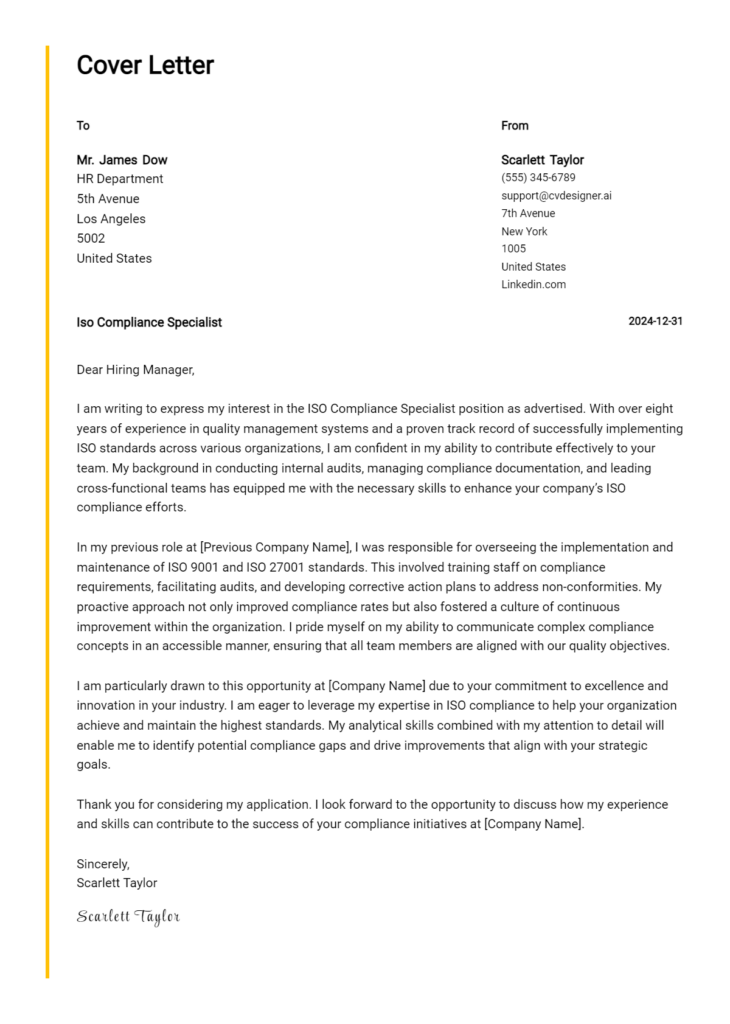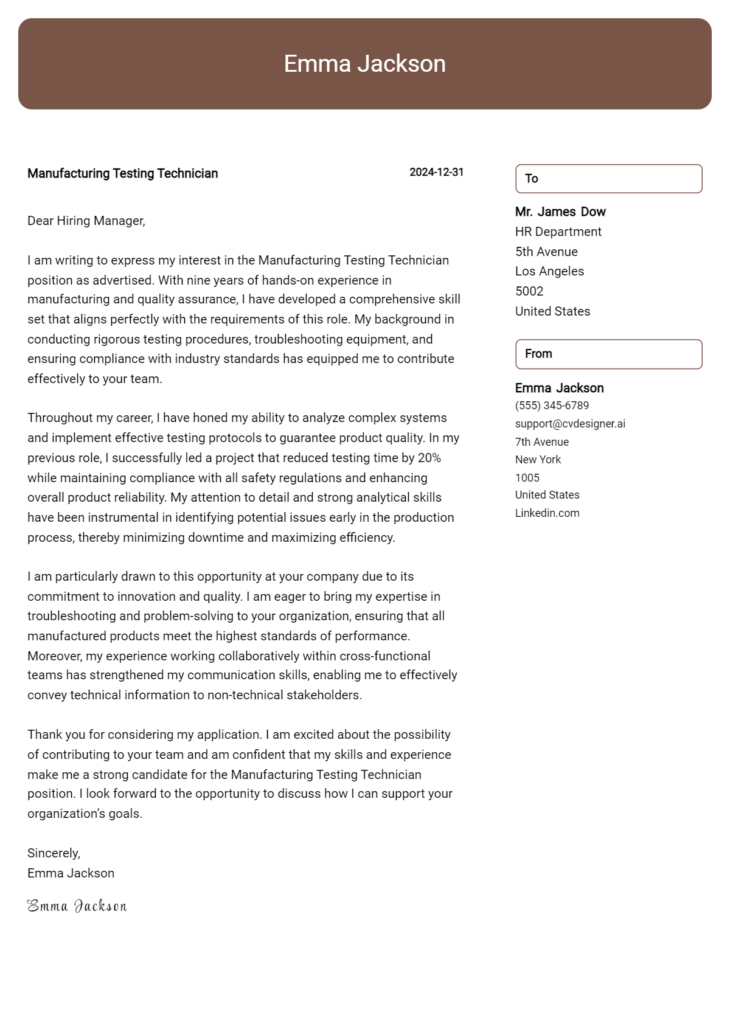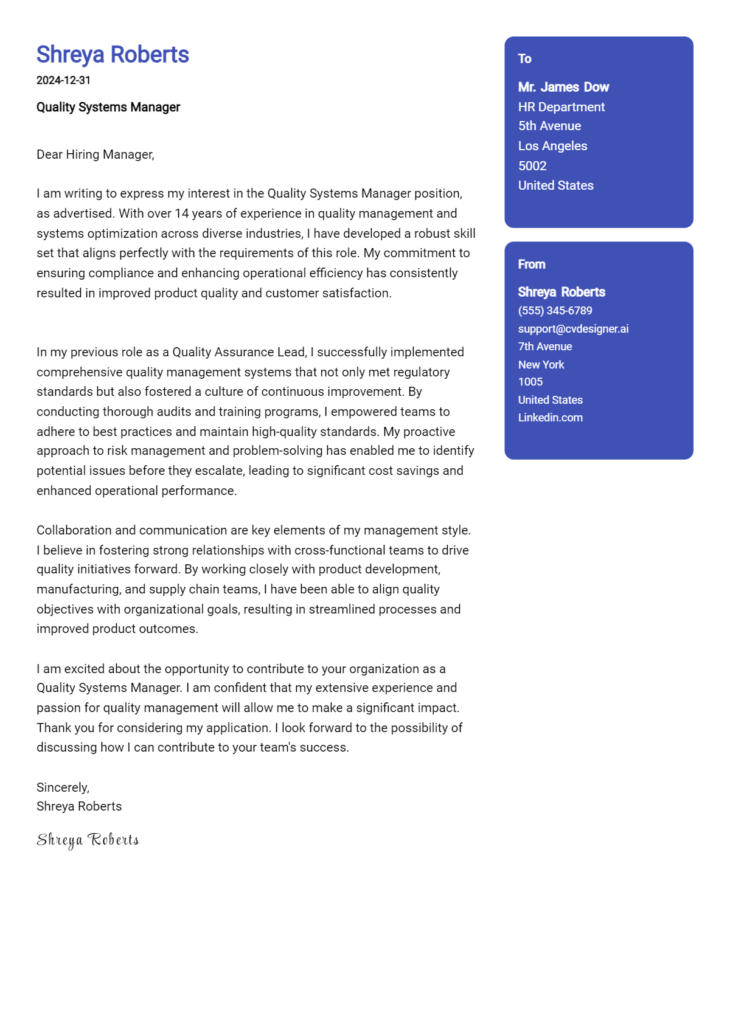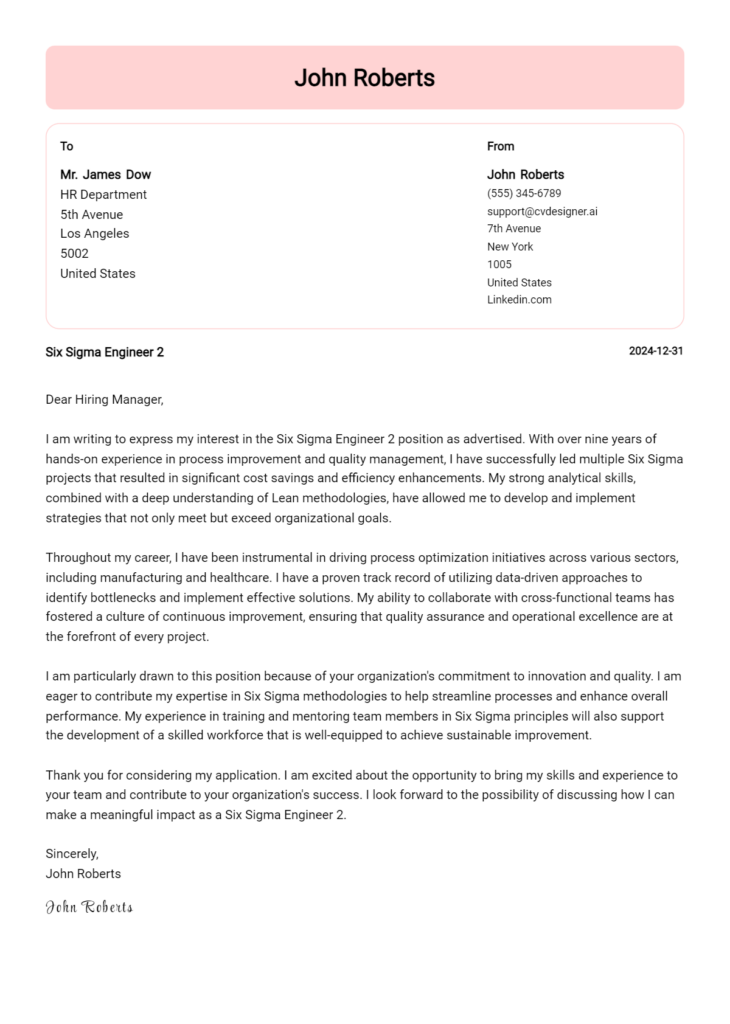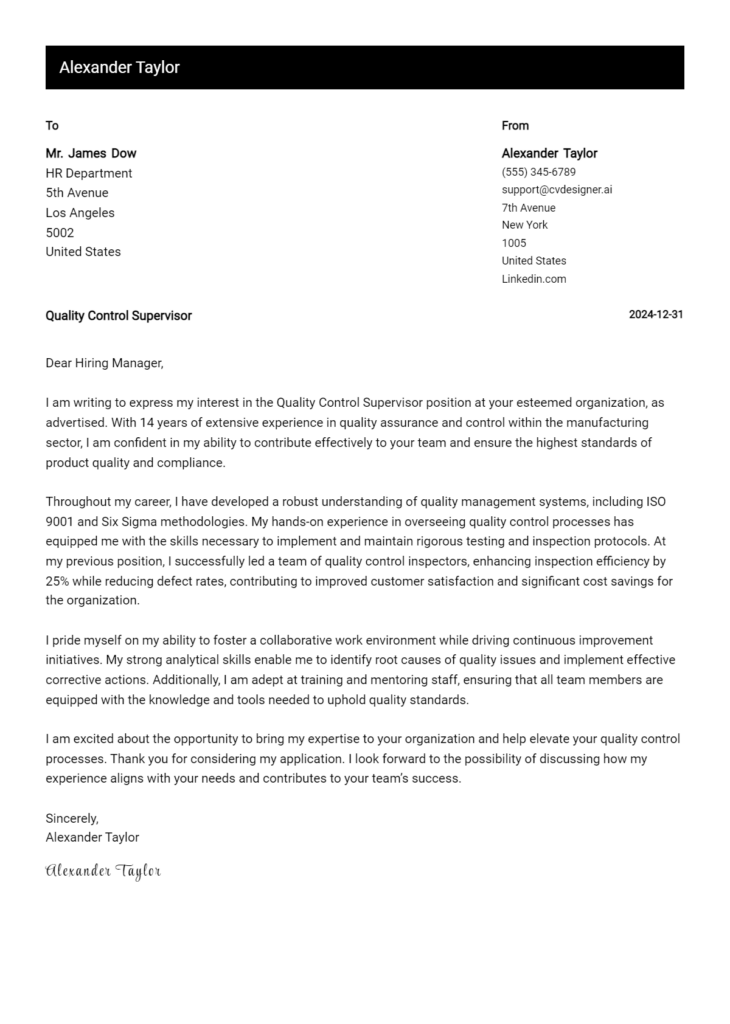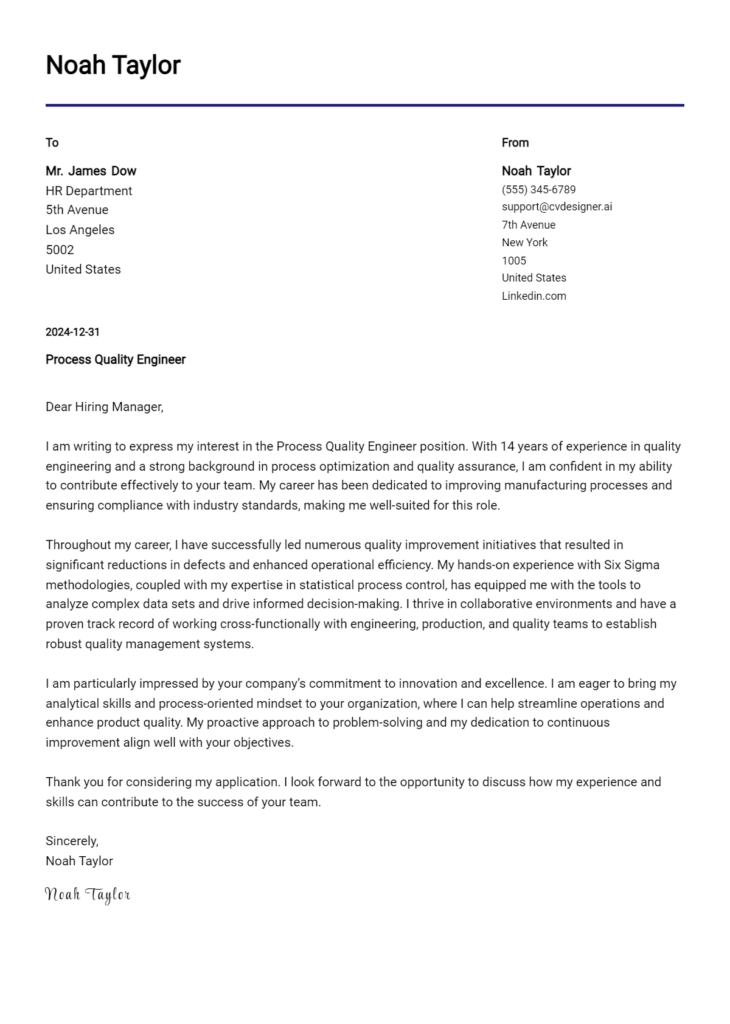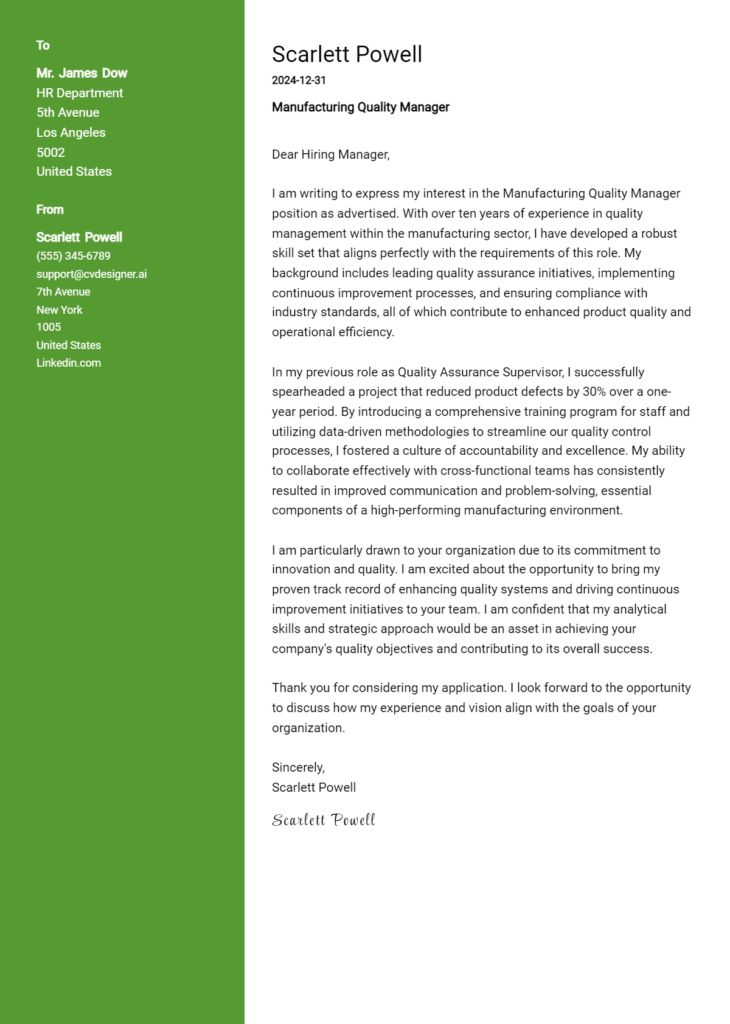Calibration Technician Cover Letter Examples
Explore additional Calibration Technician cover letter samples and guides and see what works for your level of experience or role.
How to Format a Calibration Technician Cover Letter?
Crafting an impactful cover letter is essential for a Calibration Technician, as it not only highlights your technical skills but also showcases your meticulous nature and dedication to precision. The way you format your cover letter is a reflection of your attention to detail—qualities that are crucial in calibration and quality assurance roles. A well-structured cover letter serves to engage the hiring manager and emphasizes your ability to maintain high standards in your work.
In this guide, we will explore how to effectively structure your cover letter, providing insights and examples tailored for Calibration Technicians to help you create a compelling document.
We will focus on the essential components of a professional cover letter, including:
- Cover Letter Header
- Cover Letter Greeting
- Cover Letter Introduction
- Cover Letter Body
- Cover Letter Closing
Each section plays a vital role in highlighting your qualifications and professionalism. Let’s break down each part and explain how to make your Calibration Technician cover letter stand out.
Importance of the Cover Letter Header for a Calibration Technician
The cover letter header is a critical component of a Calibration Technician's application, as it sets the tone for professionalism and clarity right from the start. A well-structured header not only provides essential contact information but also demonstrates attention to detail—an important trait for a Calibration Technician. The header should include your name, address, phone number, email, the date, and the recipient's details (name, title, company, and address). Clarity in this section ensures that your qualifications are easily accessible, which can make a significant difference in the hiring process.
Strong Example
John Doe 123 Calibration Lane Precision City, ST 12345 (123) 456-7890 johndoe@email.com October 10, 2023 Mr. James Smith Hiring Manager Tech Calibration Solutions 456 Measurement Blvd Precision City, ST 12345
Weak Example
j.doe@mail.com 123 Calibration Lane Precision City 10/10/23 To Whom It May Concern
The Importance of the Cover Letter Greeting
The greeting of your cover letter serves as the first impression you make on the hiring manager, setting the tone for the rest of your application. A well-crafted greeting not only demonstrates professionalism but also personalizes your communication, making it clear that you have taken the time to address the reader directly. This attention to detail can distinguish you from other candidates who may rely on generic salutations. To enhance your greeting, consider researching the recipient's name whenever possible; a tailored approach shows genuine interest in the position and the company. Avoiding generic greetings like "To Whom It May Concern" can significantly impact how your application is received.
Strong Greeting Example
Dear Ms. Johnson,
Weak Greeting Example
To Whom It May Concern,
The Importance of a Compelling Cover Letter Introduction for a Calibration Technician
A well-crafted cover letter introduction is crucial for any Calibration Technician seeking to make a strong impression on potential employers. This opening paragraph serves as the first point of contact with the hiring manager, making it essential to capture their attention immediately. A compelling introduction not only expresses the candidate’s enthusiasm for the role but also briefly highlights relevant skills and achievements that set them apart from other applicants. By effectively showcasing their expertise and passion, candidates can increase their chances of progressing to the next stage of the hiring process.
Strong Example
Dear [Hiring Manager's Name], I am excited to apply for the Calibration Technician position at [Company Name], where my extensive experience in precision measurement and quality assurance can significantly contribute to your team's success. With over five years of hands-on experience calibrating complex instruments and a track record of reducing errors by 30%, I am eager to bring my skills in troubleshooting and attention to detail to your esteemed organization.
Weak Example
To Whom It May Concern, I am writing to apply for the Calibration Technician job. I think I might be a good fit because I have some experience in calibration and I need a job.
Purpose of the Cover Letter Body for a Calibration Technician
The cover letter body for a Calibration Technician serves as a crucial opportunity for candidates to demonstrate their technical expertise, relevant experiences, and the unique value they bring to a potential employer. This section should highlight specific projects or accomplishments that directly relate to the calibration field, such as successful calibration processes, troubleshooting challenges, or effective implementation of quality control measures. By detailing their hands-on experience with various instruments and adherence to industry standards, candidates can illustrate their problem-solving skills and commitment to precision, making them more appealing to hiring managers.
Strong Example
As a Calibration Technician with over five years of experience, I successfully led a project to revamp the calibration processes for our manufacturing line, which resulted in a 30% reduction in downtime. I implemented advanced calibration techniques and trained a team of three new technicians, ensuring compliance with ISO standards. Additionally, I developed a tracking system that improved our equipment's maintenance schedule, significantly enhancing our operational efficiency and accuracy in product specifications.
Weak Example
I have worked as a Calibration Technician for a few years and have done some calibration work. I know how to use calibration tools and follow procedures. I think I would be a good fit for your company, as I like working with machines and am interested in improving processes.
Importance of the Cover Letter Closing for a Calibration Technician
The closing paragraph of a cover letter is crucial because it serves to summarize your qualifications, reiterate your enthusiasm for the role, and encourage the hiring manager to take the next steps, such as reviewing your resume or scheduling an interview. A strong closing can leave a lasting impression, demonstrating your professionalism and interest in the position. In contrast, a weak closing may fail to convey your qualifications effectively or lack a clear call to action, potentially diminishing your chances of moving forward in the hiring process.
Strong Example
Thank you for considering my application for the Calibration Technician position. With my extensive experience in precision measurement and my commitment to quality assurance, I am eager to contribute to your team. I am particularly drawn to your organization's dedication to innovation and excellence. I would welcome the opportunity to discuss how my skills can benefit your company further. Please feel free to contact me at your earliest convenience to schedule an interview. I look forward to the possibility of working together.
Weak Example
Thanks for reading my letter. I hope you think about my resume. I would like a job, so let me know if you're interested.
These tips are designed to assist candidates in crafting an effective cover letter for the position of Calibration Technician. A well-written cover letter is crucial for showcasing not only your technical skills but also your problem-solving abilities, knowledge of the Software Development Life Cycle (SDLC), teamwork capabilities, and passion for continuous learning. By emphasizing these attributes, you can significantly enhance your chances of landing an interview.
Cover Letter Writing Tips for Calibration Technician
Highlight Your Technical Skills: As a Calibration Technician, your technical prowess is paramount. Be specific about the tools and software you are proficient in, such as calibration equipment, data analysis software, or industry-specific standards. Mentioning your experience with relevant technologies can set you apart from other candidates. Consider using cover letter templates to structure this section effectively.
Demonstrate Problem-Solving Abilities: Employers value candidates who can tackle challenges efficiently. Share a brief example of a technical problem you encountered and how you resolved it. This not only shows your analytical skills but also your ability to work under pressure. Quantifying your achievements can make your story even more compelling.
Showcase Your Knowledge of SDLC: Understanding the Software Development Life Cycle is essential in many calibration roles. Mention any experience you have with the SDLC, particularly how it relates to testing and ensuring quality standards. This can illustrate your well-rounded skill set and adaptability within technical environments.
Emphasize Teamwork and Collaboration: Calibration often involves working closely with engineers, quality assurance teams, and production staff. Highlight instances where you successfully collaborated with others to achieve a common goal. Incorporating phrases that underscore your ability to communicate and work in a team can strengthen your cover letter.
Express Your Passion for Continuous Learning: The field of calibration is constantly evolving, and showing a commitment to ongoing education can make you a more attractive candidate. Mention any certifications, training, or workshops you have completed recently. Additionally, expressing enthusiasm for future learning opportunities can demonstrate your motivation and dedication to your profession.
By integrating these tips into your cover letter, you will create a compelling narrative that showcases your suitability for the Calibration Technician role. For additional assistance, consider utilizing a cover letter builder to help format your ideas effectively.
Common Mistakes to Avoid in a Calibration Technician Cover Letter
Crafting an effective cover letter is essential for standing out in the competitive field of calibration technology. Avoiding common mistakes can significantly enhance your chances of landing an interview. Here are some pitfalls to watch out for:
Generic Greetings: Using "To Whom It May Concern" can come off as impersonal. Instead, research the hiring manager's name and address them directly.
Lack of Specific Examples: Failing to provide concrete examples of your skills and experiences can weaken your application. Use specific instances that demonstrate your calibration expertise.
Overly Technical Language: While technical knowledge is important, using jargon excessively can alienate non-technical readers. Strive for clarity and balance.
Ignoring the Job Description: Not tailoring your cover letter to the specific job can make you seem unfocused. Highlight relevant skills and experiences that correspond to the job requirements.
Neglecting Formatting: A poorly formatted cover letter can detract from your professionalism. Follow a structured cover letter format for clarity and ease of reading.
Typos and Grammatical Errors: Simple mistakes can undermine your credibility. Proofread your letter multiple times and consider using tools or seeking help from others.
Failure to Show Enthusiasm: A lack of passion for the role can be a turn-off. Convey your interest in the position and the company to make a more compelling case.
For more insights, you can explore cover letter examples to see successful formats and styles that might inspire your own application.
Cover Letter FAQs for Calibration Technician
What should I include in my cover letter for a Calibration Technician position?
When crafting your cover letter for a Calibration Technician role, be sure to highlight your relevant technical skills, such as knowledge of calibration standards and equipment. Mention any certifications, like ISO 17025, that may strengthen your application. Include specific examples of your experience in performing calibrations, troubleshooting equipment, and ensuring compliance with industry regulations. It's also beneficial to demonstrate your attention to detail and problem-solving abilities, as these are crucial in calibration work. Lastly, express your enthusiasm for the role and the company, emphasizing how your background aligns with their needs.
How do I tailor my cover letter for a specific job listing?
To tailor your cover letter for a specific Calibration Technician job, start by carefully reading the job description. Identify keywords and required skills that the employer emphasizes. Incorporate these keywords into your cover letter, demonstrating how your experience aligns with their specific needs. For instance, if the listing mentions proficiency in specific calibration tools or software, highlight your experience with those tools. Additionally, research the company’s mission and values, and reflect them in your writing to show how you would be a good cultural fit. Tailoring your letter makes it clear that you are genuinely interested in the position.
How long should my cover letter be?
Your cover letter for a Calibration Technician position should ideally be one page long, consisting of three to four paragraphs. Aim for around 250 to 400 words to maintain the reader's attention while providing enough detail about your qualifications. Start with a compelling introduction that states the position you’re applying for and a brief overview of your relevant skills. In the body, elaborate on your specific experiences and how they relate to the job requirements. Finally, conclude with a strong closing statement that reiterates your enthusiasm for the role and invites the employer to contact you for further discussion.
Should I include technical jargon in my cover letter?
Including technical jargon in your cover letter can be beneficial, but it should be used judiciously. If you’re applying to a company that values industry-specific knowledge, demonstrating your familiarity with calibration terminology can showcase your expertise. However, avoid overwhelming the reader with excessive jargon that may obscure your key points. Instead, strike a balance by clearly explaining any technical terms you use, ensuring that your cover letter remains accessible to HR personnel who may not have a technical background. Ultimately, the goal is to demonstrate your qualifications while maintaining clarity and professionalism.
Build your Cover Letter in minutes
Use an AI-powered cover letter builder and have your letter done in 5 minutes. Just select your template and our software will guide you through the process.

